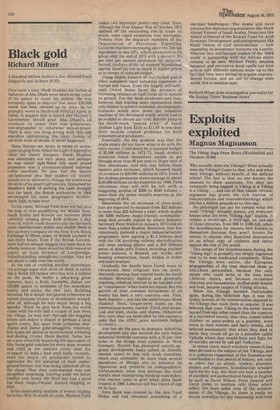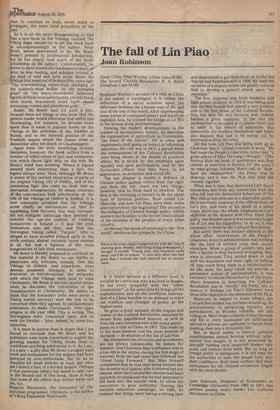Exploits exploited
Magnus Magnusson.
The Viking Saga Peter Brent (WeidenfeId arid Nicolson £5.00) Who actually were the Vikings? What actually were the Vikings? Come to that, who and what were Vikings, without benefit of the definite article? The fact is that no one knows the answers to these questions. Yet they are constantly being begged: a Viking is a Viking is a Viking . . . and out of that classic circular argument has grown the rich harvest of misconceptions and misunderstandings which has' fed a million prejudices to this day.
No philologist can say for certain what the word "Viking" actually means; yet everyone knows what the term "Viking Age" implies. It implies a sword-age, a wolf-age, an axe-age of three centuries, from 800 to 1100 AD, when the Scandinavians for reasons best known to themselves (because they aren't known for certain to anyone else) launched themselves on an ethnic orgy of violence and terror against the rest of the world.
This image of the Scandinavians during the "Viking Age" is probably too deeply ingrained now to be ever eradicated completely. When the Vikings were active, the European 'propagandists of the time depicted them as anti-Christ personified, because the only people who could write at the time were Christian clerics, and because occasional churches and monasteries, stuffed with wealth and food, became targets of Viking attacks.
When the Vikings became fashionable again, during the Victorian Age, it was the Gothic horrors of the monstrosities imputed to the Vikings that made them so popular. It was believed that your Viking-in-the-street never boozed from any other vessel than the cranium of a butchered enemy; that they tossed infant children on spear-points as a pastime, wore horns in their helmets and hairy breeks, and believed passionately that when they died in battle they would all go to a paradise called Valhalla where they would feast and fight for all eternity served by call-girl Valkyries.
In recent years, much scholarly research has been devoted to the subject of the Vikings, and to a judicious reappraisal of the Scandinavian contribution to that period of history, not only as riders but as artists, traders, pioneers, settlers and explorers. Scandinavian scholars have led the way, but there are now a number of excellent and authoritative books in English by such as David Wilson, Peter Sawyer and Gwyn Jones, to mention only three, which reflect this more sober view of the achievements of the Vikings. So there is really 110 excuse nowadays for any reasonably well-read
man to continue to hold, never mind to ropagate, the more lurid prejudices of the epast. So it is all the more disappointing to find that a new book on the Vikings, entitled The Viking Saga, should try to set the clock back so uncompromisingly as the author, Peter Brent, seems determined to do. Mr Brent doesn't pretend to professional scholarship, ' but he has clearly read much of the latest scholarship on the subject. Unfortunately, he seems to have missed the fundamental point of what he was reading, and indulges instead in the kind of wild and lurid prose about the Vikings that went out of fashion fifty years ago: -The overwhelming rotten-fruit thudding of the suddenly-dead bodies on the trampled grass" Or "the heavy-shouldered, helmeted figures of these cruel adventurers, swords black With blood, braceleted arms tight about screaming women and plundered gold ..."
Really, Mr Brent! And it's such a pity, because there are things in this book that the general reader would otherwise find useful and illuminating. For instance, he devotes more space than is usual in popular books on the Vikings to the activities of the Swedes in Russia, and to the internal politics of the Frankish empire which the Danes tried to dismember after the death of Charlemagne.
Apart from the truly horrifying stylistic blemishes, however, the book suffers from a number of wilful errors of fact and interpretation which throw light only on the way Mr Brent's mind was working. Where a legend seemed more interesting than a fact, the legend always wins. Thus, although Mr Brent is aware of the current excavation of parts of the original Viking -city of Dublin, and of the interesting light this casts on their role as mercantile entrepreneurs, he seems unaware of the concomitant Irish scholarship on the role of the Vikings as raiders in Ireland. It is now commonly accepted that the Vikings acted chiefly as mercenaries on hire to squabbling Irish factions; that they certainly did not instigate (although they learned to imitate) the age-old custom of robbing monasteries in Ireland — it was the Irish themselves who did that; and that the Norwegian Viking called "Turgeis", who is alleged to have invaded Ireland early in the ninth century, almost certainly never existed at all, but was a figment of the vivid imaginations of late Irish chroniclers.
Mr Brent is blandly prepared to overlook all this material in his desire to use myths to perpetuate silly attitudes, namely, that the Vikings in Ireland, and elsewhere, were demons possessed. Similarly, in order to dramatise, or melodramatise, 'the antipathy with which the Vikings were held to view Christianity, Mr Brent is led into woeful errors when he discusses the conversion of the Scandinavians to Christianity. He seems to think that the Icelanders (who were never a Viking nation anyway) were the last to be converted when they agreed, by parliamentary arbitration, to make Christianity their state religion in the year 1000. This is wrong. The Norwegians were 'converted' later, and so were the Swedes — later, indeed, by some Cwo centuries.
It is more in sorrow than in anger that I am forced to conclude that Mr Brent and his publishers were more concerned to exploit the growing market for Viking books than to contribute anything substantial to it. As I say, it's a pity — a pity that Mr Brent's evident hard 'work and enthusiasm for the subject had been betrayed by over-enthusiasm. But let us be thankful for small mercies at least: not once did I detect a hint of a horned helmet. Perhaps if that particular fallacy has failed to take root in the fecund soil of this book, there is hope that some of the others may wither away and die, too.
Magnus Manusson, the presenter of the television programme. Chronicle, is the author of Viking Expansion Westwards



































 Previous page
Previous page